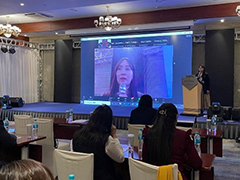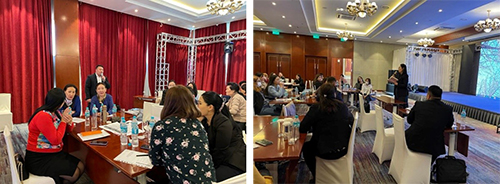- Home
- Technical Cooperation Projects
- Index of Countries
- Asia
- Mongolia
- The Project for Strengthening Teachers' Ability and Reasonable Treatments for Children with Disabilities (START) Phase 2
- Project News
- A Hybrid Training for Children with Disabilities was conducted for the members of "Sub-Commission for Health, Education, and Social Security for Children with Disabilities"
Project News
2022-04-27
A Hybrid Training for Children with Disabilities was conducted for the members of "Sub-Commission for Health, Education, and Social Security for Children with Disabilities"
On April 27, 2022, the 3rd training was held for the "Sub-Commission for Health, Education, and Social Security for Children with Disabilities (hereinafter referred to as the Sub Commission)". The sub-commissions of 9 districts of Ulaanbaatar and 4 provinces attended the training in person, and the sub-commissions of the other 17 provinces participated online. The objective of the training was to make the sub- commission members to become able to support children with disabilities, and children having difficulties attending school before the new semester starts in September.
On the day of the event, Ms. Tungalagtamir, the director, the Department of Population and Development, the Ministry of Labor and Social Protection, acted as a facilitator. First, a project expert commented on the training output conducted in November 2021, and the pre-assignments given to the participants before this training. After that, the Bagakhangai District, which participated in the training in the venue, and the Sub Commission of Khentii Province, which participated online, shared their practice on the development and implementation of the development support plan with other participants.
Then, from the venue, we connected online with a young Japanese man living with a respirator, and his mother. He delivered a lecture entitled "There are many possibilities even if you have a severe disability!" When the documentary film of this young man was shown, the participants at the venue gazed at the screen and listened to the story with a loud nod, and tears from time to time. During the Q&A session, in addition to questions about the allowances and assistance rules provided, a participant made the following comment. " In my province/aimag, one special class is set up for each kindergarten and school . Many families prefer to enroll their children in a special class because they can receive generous support. Still, after listening to today's lecture, the first thing to consider is not the degree of physical support such as "diaper supply". Now I noticed that it was the development of a child. We would like to consider introducing a "care/welfare taxi" system in our province to support children with severe disabilities in school. "
After that, the project expert explained the "School Enrolment Support Meeting", based on the "Procedures for Comprehensive Developmental Support for Children with Disabilities" revised in December 2021. The morning session ended with the introduction of the experience by the Bagahangai District, which held a meeting on April 12. The online participants were dismissed at this point.
In the afternoon, the venue participants were divided by district and province to carry out group work to list possible supports and institutions that can cooperate with them. The issues related to school attendance were categorized into 5 categories: "parents/homes", "access to school", "environment in the school", "teaching method," and "relations among children".
Finally, the Ministry of Labor and Social Protection, the Commission of Education, Health and Social Protection Children with Disabilities, presented the progress of the ongoing development of the portal site under development along with the Project.
Each sub-commission was asked to hold a case conference based on the lessons learned from this training and to report on the implementation status of the development support plan submitted as a preliminary task this time. We hope that the members of the sub-commissions will work on school support for children with disabilities after attending this training.
 Hybrid delivery
Hybrid delivery
 Group Work facilitation by MLSP Officials
Group Work facilitation by MLSP Officials
- About JICA
- News & Features
- Countries & Regions
- Our Work
- Thematic Issues
- Types of Assistance
- Partnerships with Other Development Partners
- Climate Change / Environmental and Social Considerations
- Evaluations
- Compliance and Anti-corruption
- Science and Technology Cooperation on Global Issues
- Research
- JICA Development Studies Program / JICA Chair
- Support for the Acceptance of Foreign HRs / Multicultural and Inclusive Community
- Publications
- Investor Relations
